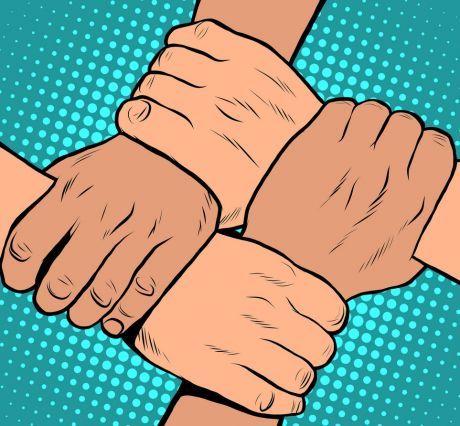Columns
You are here
Does "human nature" make socialism impossible?

January 3, 2020
We’ve all heard the arguments against socialism. ‘It will never work because of human nature.’ ‘Human beings are naturally greedy.’ ‘Revolution could never work because people are power-hungry.’ These are the common-sense ideas of capitalist society.
However, in the Theses on Feuerbach (1845), Marx criticizes the traditional conception of human nature as a species which incarnates itself in each individual, instead arguing that the conception of human nature is formed by the totality of social relations. Therefore, the whole of human nature is not understood, as in classical idealist philosophy, as permanent and universal: the species-being is always determined in a specific social and historical formation, with some aspects being biological.
The reason it suits capitalism and the ideologues who support it, to see human nature as ahistorical, unchanging and set in stone is because they want us to see their system in the same way – as one that has always existed, or if it hasn’t always existed, it is at least the pinnacle of human achievement and tampering with it in any way will bring us to ruin.
But if we start to look at capitalism as just a phase of human history, as a system that can be studied and understood like any other epoch, like that of feudalism, for example, we can begin to see that what we call human nature has changed throughout history and depends very much on the nature of the system we live under.
If we look at the institution of the family this becomes very clear. In pre-class societies human beings lived very differently than they do today. There was no notion of women as property and people did not live in the nuclear family that we consider to be ‘natural’ today.
Mostly human beings lived in tribes or clans that were nomadic and survived by pooling resources. It was a hard-scrabble existence in many ways since these were societies of scarcity, but they were roughly egalitarian because the only way people could survive was to depend on each other and their clan. Children were not the property of individual parents but rather the responsibility and future of the whole community.
With the development of agriculture came a more sedentary, stable society where it was possible to accumulate a surplus for the first time in human history, at least for a minority of the population. At this point the individual household became the financial unit and the patriarchal household of feudalism came into being.
It’s only with the advent of the Industrial Revolution in the 19thcentury that we see the development of the more modern version of the nuclear family that many now see as the ‘normal’, ‘natural’ way for human beings to co-exist. But there is nothing natural about it.
Under capitalism the family is the site of women’s oppression. Women bear the double burden of housework, rearing the next generation of workers (all at little or no cost to the capitalist) and often also working outside the home in the ‘male’ sphere to help keep the family afloat.
The myth of romantic love is the sugar pill that’s supposed to make this unequal arrangement palatable but it’s another example of what Marx talked about – how the ideology of the ruling class becomes the ‘common sense’ of the working class.
The artificial creation of ‘women’s nature’ as a negation of any personal desires makes it clear that biology is not destiny, but rather the system we live under works to shape what we see as our natural being, which is really what works for the system, not necessarily for the human beings living under it.
Likewise, greed or the drive to wield power over others are not innate to our nature and would have been incomprehensible concepts to our hunter-gatherer ancestors. If you live in a society where competition is the watchword and where it’s a struggle to survive it’s no surprise that greed might become a common trait.
But even here let’s look at where real greed lies. Is it the single mother who steals food to feed her children or is it the 1%, the billionaires who own and control the wealth under capitalism, who refuse to pay taxes and who then feed us the ideology that anyone can become rich in this society if they work hard enough. Between Jeff Bezos, owner of Amazon, and the workers who toil in his warehouses in truly inhuman conditions, it’s clear where ruthless greed actually resides.
What is astonishing about the vast majority of people, even under capitalism, is how much people cooperate and care for each other, in spite of the immense pressures placed upon them by an inhuman system. The millions who joined the anti-war movement, the millions who are demonstrating and fighting for the climate and for a sustainable earth today, the protesters in Chile putting their lives on the line against 30 years of austerity, the strikers in France who refuse to bow down to Macron as he tries to take away their pensions and their future, are not doing it for any private gain or praise but because they want a future for their children, for themselves and for the planet.
As Marx would have understood, it’s only if we are able to replace capitalism with a system based, not on greed for the few, but on sharing of resources by all, that we will truly become human.
Section:









